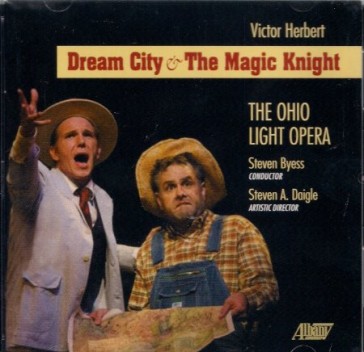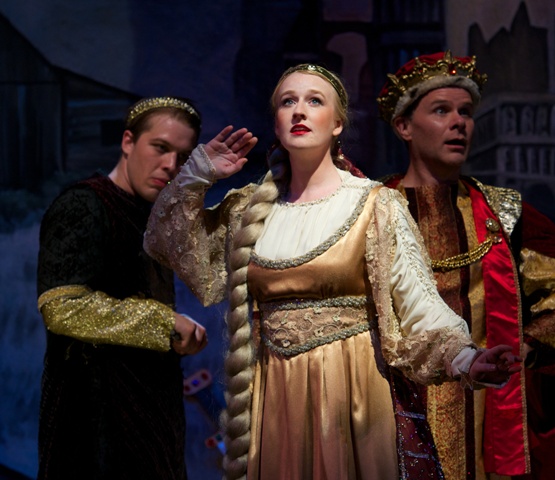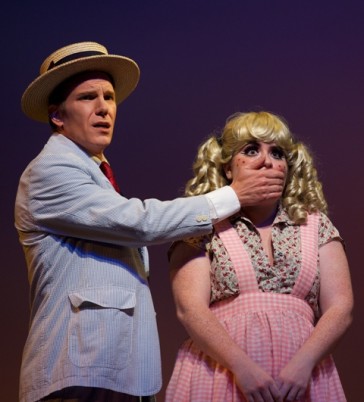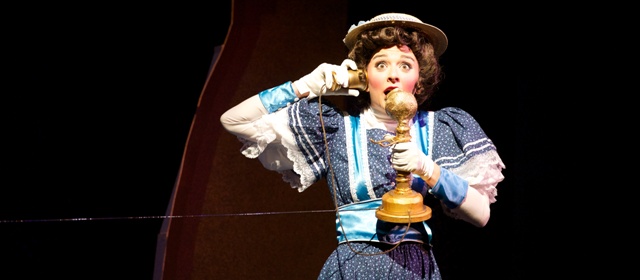Steven Ledbetter
Operetta Research Center
26 July, 2015
Victor Herbert is best known today for half a dozen elaborately musical operettas composed in the first decade and a half of the 20th century. But he composed nearly 50 works for the musical theater of every type, from a kind of farce to grand opera (Natoma). He also was an effective writer of art songs, of substantial orchestral works, including three concertos for his own instrument (the cello), of marches, and of light orchestral works of the type we hear today mostly in Pops concerts. And that is not to mention his composition of the first original film score in the US.

CD cover for the Ohio Light Opera production of “Dream City And The Magic Knight.”
Dream City and The Magic Knight may be his most unusual Broadway score of all. It was forgotten by all but specialists until the Ohio Light Opera revived it last summer, with results that are now available on record. Herbert was commissioned by Joe Weber, who had become famous in a “Dutch comedian” (that is in German dialect) act with his partner Lew Fields. When the team broke up, Weber wanted to produce something of a more “elevated” quality, and he persuaded Herbert to compose the score to a book by Edward Smith. It is likely that Herbert agreed largely because the centerpiece of the evening was to be a parody of Wagner’s Lohengrin, and Herbert, a great admirer of Wagner, surely found the opportunity too good to refuse.

Emily Nelson as Elsa, “A typical grand operatic maiden in the usual distressing predicament.” (Photo: Matt Dilyard/OLO)
The basic plot is a satire on real estate development on Long Island. A fast-talking city slicker persuades the farmer Wilhelm Dinglebender that he could make a fortune by selling his farm for the land on which to create a new city that would soon outshine New York. The centerpiece of the city is a grand opera house, to which all the residents will go for cultural enrichment. Dinglebender falls asleep and dreams what this new metropolis – Dream City – will be like. In his dream, he experiences the opera itself, The Magic Knight, and awakens so disillusioned that he refuses to move ahead with the project. He is happy with the life he has.

Daniel Neer as Wilhelm Dingelbender and his wife Maria, played to perfection by Julie Wright Costa. (Photo: Matt Dilyard/OLO)
When it was produced in New York in 1906, the piece was hailed by the press for the tunefulness of Herbert’s songs and especially for the Magic Knight, which is surely the most brilliant thorough-going operatic parody ever written. One would have guessed that it would continue to be one of Herbert’s most successful and best-remembered works.

Tenor Clark Sturdevant as Lohengrin, “A professional rescuer of distressed maidens.” (Photo: Matt Dilyard/OLO)
That this did not happen is due to Joe Weber’s attempt to deny the composer some of the royalties that his contribution to the show surely earned him. When Dream City toured to Chicago, Weber insisted that he could not afford to pay Herbert the 3% royalty in his contract and demanded that he accept 2%. When Herbert refused, Weber (foolishly!) hired another composer to rewrite the entire score. Audiences in Chicago thought they were getting Victor Herbert; the production failed miserably, and it left Dream City tarnished in reputation. No one ever attempted to revive the show until 2014.

Alexa Devlin as the dippy farm helper Amanda Boggs, in discussion with city swell J.B. Holmes, played by Nathan Brian. (Photo: Matt Dilyard/OLO)
For those who know some of Victor Herbert’s most famous lilting waltz songs, written for operatic sopranos, the score of Dream City will be a surprise – a delightful one. For here Herbert shows that he can write songs in any style whatever popular in the musical theater of the day: countrified, citified, “plantation songs,” lively comic songs sometimes with a ragtime touch. And of top of that is the brilliant music of The Magic Knight, which takes the basic plot of Lohengrin and sets it with some major themes derived directly from Wagner; these are interspersed with popular song styles as well. As befits a parody, it is very self-conscious. The chorus insists that audiences come to see and hear them, especially if they are wearing costumes designed “for apparent use in torrid latitude.” And when the King says to Elsa (who is summoned for a trial for making away with her brother, and she seems altogether too light-hearted), “Your conduct’s rather kittenish for a maiden charged as you are,” she replied, “I know not what I’m charged with, unless it be cadenzas!” And she flies off on a series of deliciously ludicrous coloratura phrases.
Herbert even manages to quote a phrase from one of the biggest Tin Pan Alley songs of the year 1906, “Waiting at the church”: it’s climactic punch line “My wife won’t let me!”
When Lohengrin takes his final leave of Elsa (a tragic moment in Wagner), Herbert sends him on his way in cancan style: “Ta ta, ta ta, my dainty little darling!”

The full cast for the Wagnerian “Magic Knight” interlude. (Photo: Matt Dilyard/OLO)
The singing throughout by the Ohio Light Opera cast is very fine, but special mention must be made of the principal love interests, Dinglebender’s daughter Nancy (Natalie Ballenger) and her sweetheart, the artist Henri d’Absinthe (Stephen Faulk), and by the leading figures in the “opera”: Ted Christopher as the King, Emily Nelson as Elsa, and Clark Sturdevant as Lohengrin. Steven Byess conducts the OLO orchestra effectively in both the “lighter” style songs and in the “opera.” At the end of the “opera,” OLO recreates the appearance of leading popular singers of the day performing songs like “Come down, ma evening star” as if she were Lillian Russell. Natalie Ballenger made sensational work of that scene.

The fabulous Natalie Ballenger in a telephone duett. (Photo: Matt Dilyard/OLO)
As far as I know, this is the only commercially recorded example of one of Victor Herbert’s theater works aside from such grand (and wonderful) operettas as Naughty Marietta, Sweethearts, Mlle Modiste, and Eileen. As such it gives a much broader sense of Victor Herbert’s range in the musical theater and suggests that there are hidden gems among the other 40 or so unknown shows.

Nathan Brian demonstrating that operetta actors can dance – very well. (Photo: Matt Dilyard/OLO)

I saw this live last year in Wooster and truly loved it. Musically, it stood out from the rest of the festival offerings. The entire cast seemed to have more fun and get the vaudeville style much better here than in other operettas they presented. I hope this joy and stylish polish comes across on the CD.
I, too, saw this in Wooster, and I too thought it the highlight of the season … I hope other folk will pick it up and produce it in the wake of this recording … particularly with Daniel Neer and Natalie Ballenger repeating their roles. Stunning performances ..